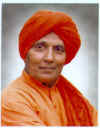|
Page 4 of 4
Peace in South Asia - is it
attainable?
the-south-asian
asks Swami Agnivesh
&
Rev. Valson Thampu
(cntd.)


Swami Agnivesh & Rev. Valson Thampu
"...we suffer from a famine of true
statesmanship. We have chair-matic leaders."
Should religion be confined to an
individual's home, and not be seen or
heard outside its confines?
The answer to this depends on what we mean by religion. Religion as a mere
label that serves only to fragment society, religion that lends itself to
legitimizing inhuman practices like caste, religion that makes people more,
rather than less, selfish and irrational, needs to be not only privatized
but positively discouraged. It is a crime, for instance, to brew or consume
illicit liquor at home. Why should illicit religion be treated differently,
when it does at least as much, if not more, harm even at home than illicit
liquor does? But this should apply only to illicit religion. The problem
in privatizing religion is that it brings about the privatization of values
also, as is evident from the contemporary Indian scenario. Religions are the
fountain-springs of values; though, in a state of degeneration, they could
also be the sewers of corruption. The basic question is not if religion
should be privatized, but if religion should not be reformed and spiritually
regenerated. It is true, for instance, that depraved religiosity makes
people revel in murder, bloodshed, rape and other forms of inhumanities. But
it is also true that true religion inspires people even to lay down their
lives for noble causes and fortifies them to take enormous pain in the
service of their fellow human beings. Gandhiji and Mother Teresa are two
ready examples to hand. It is interesting to note that the corrupt are
especially eager to exile religion from the public space; for whatever
discomfort of conscience that still plagues them stems from this source.
While religion as spirituality should continue to value-nourish our society
and culture, religion as partisan advocacies, obscurantist practices,
communal divisiveness, and irrational hostilities must not only be confined
to the private sphere of life but refined out of existence altogether. The
assumption that there can be a neat compartmentalization between public
space and private life is a naïve one. What thrives in private life will
catch up with public life and vice versa. But this is, ideally, not a
domain of executive or legislative action, but of the informed choice of
citizens who need to be educated and empowered to make secularism-friendly
choices in public life.
Is there room for faith-based institutions
and political parties in a
secular society?
As long as organized or institutionalized religions exist, it is impossible
to create a society free from faith-based institutions. The mere absence of
such institutions is no secular achievement. The key issue is if we succeed
or fail in propagating and empowering an authentic secular culture, which is
the merit of the advanced secular societies in the west. The tragedy in the
South Asian context is that we have internalized a fatal misunderstanding of
the scope of the State. For us, the function of the State is to manage or
mismanage material resources. That the State has a duty to propagate and
uphold values and norms -especially secular norms- is something that we have
conveniently forgotten. If the Sate is not a propagator of positive values,
it will be the practitioner of anti-values, as is the case with governments
in this region. If the citizens are nurtured in the ethos and ethics of a
secular way of life, the existence of faith-related institutions in a
society will cease to be, in itself, subversive. It is naïve to assume that
by banishing faith-based institutions, whatever they are, we can solve all
problems. The fact of the matter is that no faith-based institution can
imperil the society without outright State patronage and massive financial
backing.
Your comments on the leadership (or the
absence of it!) in south Asian
countries.
South Asia today abounds in politicians. But we suffer from a famine of true
statesmanship. We have chair-matic leaders, if you like. "Chair-matic"
leaders are worthies who matter only because they happen to occupy chairs.
The moment they are un-seated, they become pathetic and mediocre. Men and
women of stature -charismatic leaders- have vanished from our horizon. In
the last three decades in particular we have seen the triumph of the
bureaucratic over the charismatic. A charismatic leader would have the
courage of conviction to take bold and, if need be, risky decisions to steer
the course of history to a new direction; whereas politicians are driven
only by the desire to turn every situation to their own short-term
advantage. The pathetic silence of the Prime Minister of India, in the wake
of the scandalous communal carnage in Gujarat that raged for nearly 3
months, is a dramatic illustration of this reality. Gen. Musharraf in
Pakistan may seem a smart customer; but is still a long way away
from being a statesman. The imperative of true statesmanship in South Asia
is to promote regional unity and cooperation and turn the Indian
sub-continent into a sanctuary of peace rather than a theatre of war.
Leadership, as Gandhiji understood, is born in the furnace of an unselfish
commitment: the irresistible desire to lead a people to their highest
potential -of which they themselves may not have any clear idea- and to
enrich their lives. The phenomenon that is born out of the mean desire for
self-perpetuation in chairs of power is a caricature of leadership. Many of
the leaders in this region seem eager to be no better than animated
cartoons.
__________________________
Disclaimer |

